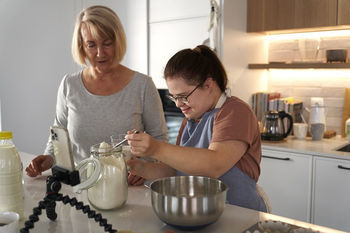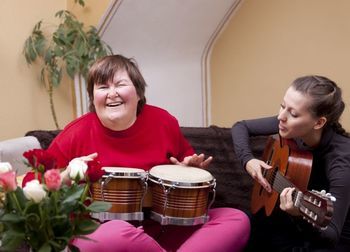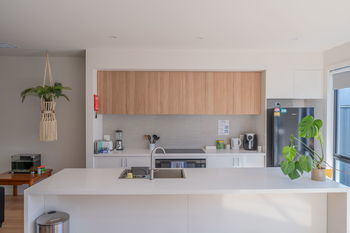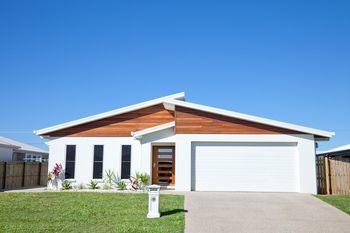Supported Independent Living at MDS
Empowering You to Live Independently
Your Home - Your Choice - Your Control
At Melbourne Disability Services (MDS), we provide NDIS-funded Supported Independent Living (SIL) options that focus on building your skills, maintaining your independence, and helping you feel safe, supported and in control of your everyday life.
SIL is more than just daily support, it's about creating a lifestyle that empowers you to achieve your goals, make meaningful choices and enjoy your home with confidence.
Whether you are seeking to live on your own or with others, we work with you to develop a living arrangement that aligns with your needs, preferences and long-term goals.
Our Approach to Supported Independent Living (SIL)
We believe that your SIL journey should feel positive, empowering and personalised.
That’s why MDS takes a person-centred approach to everything we do, from matching you with the right home and housemates, to setting up a tailored support schedule that reflects your routines, interests and goals.
Our homes are designed to provide:
- Safe, comfortable, NDIS compliant environments
- Shared living options with carefully matched housemates
- Daily support focused on capacity building and independence
- Culturally aware and compassionate support teams
Shared Accommodation: Finding the Right Fit
When you're living with other people and sharing supports, compatibility matters.
We carefully consider:
- Your age, personality, lifestyle and interests
- Your daily routines and preferred support times
- The type of environment you thrive in
- Your preferences around culture, language and social dynamics
We take the time to get to know you and ask the right questions to find housemates and a living setup you’ll feel comfortable and happy with.
Let us know what your ideal home looks like and we’ll help make it a reality.
SIL + SDA: Holistic Supported Accommodation
MDS specialises in delivering both Supported Independent Living (SIL) and Specialist Disability Accommodation (SDA) for eligible NDIS participants.
We take a holistic approach, helping you:
- Explore available SDA properties that match your support needs
- Understand your SIL and SDA funding
- Choose a home where your lifestyle, culture and personality are respected
- Transition smoothly with support from our SIL coordination team
Our goal is to deliver accommodation solutions that reflect your individuality and empower you to live the life you want.
Why Choose MDS for SIL?
Registered NDIS Provider
Person-centred & culturally responsive approach
Extensive experience in matching residents with the right homes
Focus on independence, choice and skill development
We work directly with Support Coordinators, families, and stakeholders
Our SIL Process
Step 1Speak to a SIL SpecialistCall us on 03 8351 9901, email SIL@melbournedisabilityservices.com.au or complete our SIL enquiry form to get started. | Step 2Book an Intake ConsultationWe’ll connect you with one of our friendly team members to understand your needs and what you're looking for in a new home. | Step 3Visit Available HomesWe’ll arrange property tours so you can view available SIL homes and meet other residents, with your family, support person, or coordinator by your side. | Step 4Support Your TransitionWe work with your current providers and team to ensure a smooth and supported transition into your new home. |
Ready to Find Your SIL Home?
Let MDS help you take the next step toward independent living with the right support. Accessing our Supported Independent Living (SIL) services is simple and hassle-free. Contact us on 03 8351 9901 or fill out the enquiry form below and one of our friendly team members will contact you to discuss your housing and support needs.
Frequently Asked Questions
| 1. What is NDIS Supported Independent Living (SIL)? | Supported Independent Living (SIL) is an NDIS-funded support designed for people with disabilities who need help with daily tasks while living in a shared or independent home. SIL provides assistance with personal care, household tasks, and skill development, helping |
| 2. Who is eligible for NDIS SIL funding? | To be eligible for NDIS SIL funding, you must:
Your eligibility is assessed by the NDIS planning team, who will determine if SIL is the right support for your needs. |
| 3. How do I apply for NDIS SIL funding? | Applying for SIL funding involves these steps:
A support coordinator can help navigate the process to ensure you receive the right funding. |
| 4. What services are included in SIL? |
The level of support varies based on individual needs and NDIS funding. |
| 5. Can I choose my own SIL provider? | Yes! As an NDIS participant, you have full choice and control over selecting your SIL provider. When choosing a provider, consider:
It’s important to choose a provider that aligns with your goals and support needs. |
| 6. What factors affect my SIL funding? | Your NDIS SIL funding is based on several factors, including:
|
| 7. How can I find NDIS SIL vacancies near me? | To find SIL vacancies, you can:
|
| 8. What should I look for in a SIL provider? | When choosing an NDIS SIL provider, look for:
|
| 9. Can I receive SIL funding while living alone? | SIL is typically for shared housing, but in some cases, you may qualify for SIL funding while living alone if:
Speak with your support coordinator to see if individual SIL funding is right for you. |
| 10. How long does it take to get approved for SIL? | The NDIS SIL approval process can take anywhere from a few weeks to several months, depending on:
To speed up approval, ensure you provide a clear case for SIL funding with professional reports from therapists or doctors. |
| 11. What is the difference between SIL and SDA? | SIL (Supported Independent Living) focuses on support services, while SDA (Specialist Disability Accommodation) is about the physical home itself.
Many participants receive both SDA and SIL if they require specialized housing and support. |
| 12. What happens if I’m not happy with my SIL provider? | If you’re unhappy with your SIL provider, you can:
You have the right to change providers if your current support is not working for you. |






